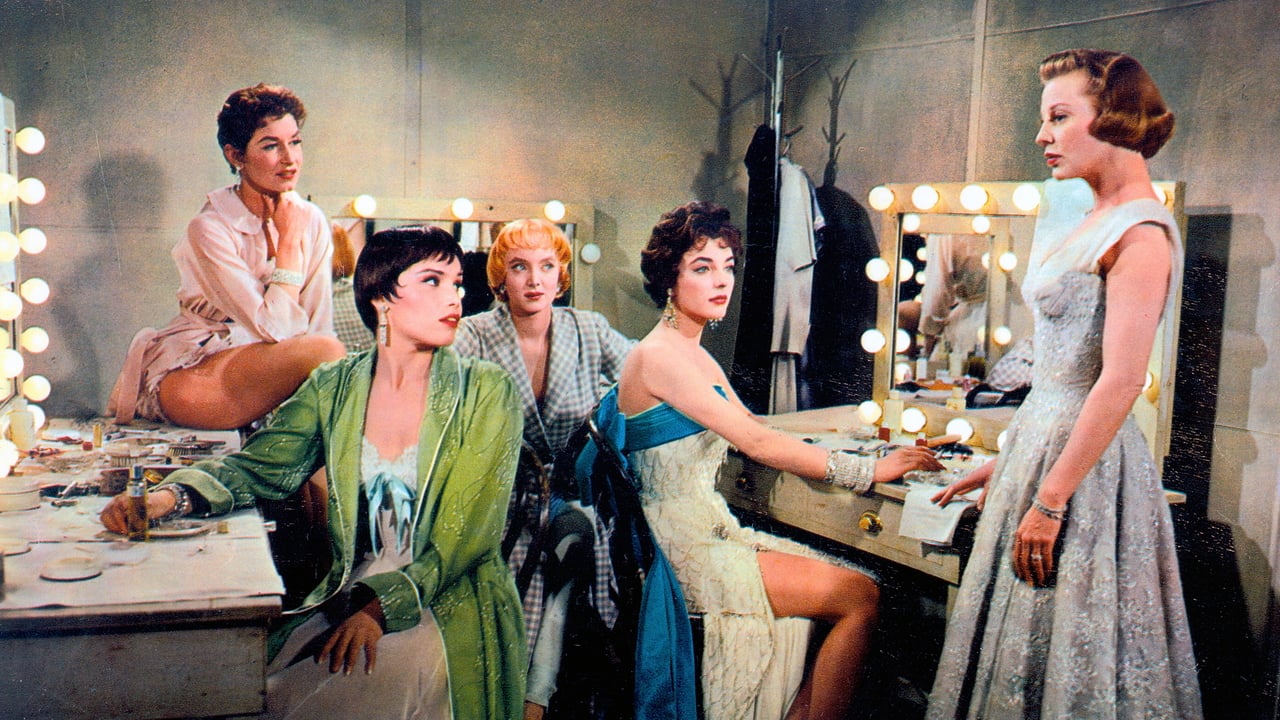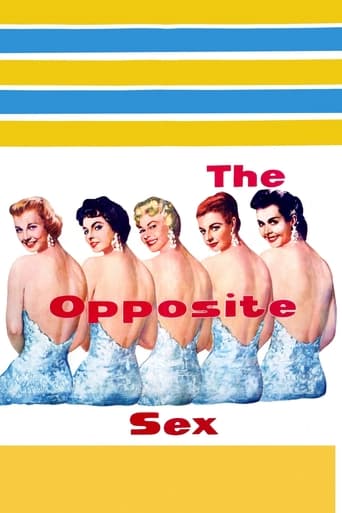



This Movie Can Only Be Described With One Word.
an ambitious but ultimately ineffective debut endeavor.
View MoreThe movie's neither hopeful in contrived ways, nor hopeless in different contrived ways. Somehow it manages to be wonderful
View MoreIt's simply great fun, a winsome film and an occasionally over-the-top luxury fantasy that never flags.
View MoreImagine a film called "The Men", dealing with heterosexual love and romance but with an all-male cast. The wives, girlfriends and mistresses of the men are often referred to but never actually seen on screen. What, I wonder, would be the reaction of the critics? I suspect that they would simply dismiss this as a ridiculous idea. As if you could make a film about the relationship between the sexes without showing the female half of the equation! Yet when the gender-roles are reversed, the result is a marvellous classic of the cinema. That isn't, admittedly, my opinion of "The Women", but it seems to be the opinion of most reviewers on this board who regard George Cukor's 1939 comedy with such reverence that any attempt to remake it is almost blasphemous. Hence a lot of the bile directed at "The Opposite Sex" on here. It also seems to have been the opinion of some reviewers in 1956 and also of cinema-goers; it made a loss at the box-office. Unlike some so-called "remakes", this one follows the original plot fairly closely. The main character, here called Kay Hilliard, appears to be happily married, but her husband Steven is actually having an affair with a young woman named Crystal Allen. They say that in such situations the wife is always the last to know, and so it proves, but as Kay has the sort of friends who (in the words of the song) "just can't wait to bring all of that bad news to her door", the interval between the rest of the world knowing and her finding out herself is only a short one. Kay travels to Reno (then the divorce capital of America) to obtain a divorce, but soon starts to regret her decision. The film is mentioned in Esther Williams' autobiography, "The Million Dollar Mermaid". Apparently Dore Schary, studio head of MGM, wanted to cast Williams as Kay, but she refused, leading to her suspension from the studio. The film is hardly a masterpiece, but it does not fall so far below the artistic standards of the average Esther Williams movie (and most of them were pretty cheesy) to make worthwhile the loss of the $3 million in deferred contract payments which (according to her) she forfeited through her obstinacy. I wonder, however, how the film might have turned out had Esther ("Wet she's a star, dry she ain't!") accepted the role? Would it have been an extravagant water ballet with Kay a former Olympic swimming champion and her scandal-mongering friends all members of the same swimming club, ending with a massive cat- fight between Kay and Crystal in the deep end of the pool? (That might have been worth seeing!) As things were, however, June Allyson ("Dry she's a star, wet she ain't!") obviously lacked Esther's aquatic talents, so the film was made as the sort of semi-musical in which the characters sing, but only in situations where people sing in real life, so Kay becomes a retired singer who makes a comeback after her divorce, Steven a Broadway producer and Crystal a showgirl in one of his productions. So is this film better or worse than "The Women"? Well, in some areas the original is definitely superior. Norma Shearer was quite good as the Kay character (called Mary in the original), but Allyson is just dull and stodgy, making it all too easy for the audience to understand why Steven wanted to be rid of her. (Less easy to understand why he wanted her back). The child-star Virginia Weidler was enchanting as Little Mary, but Sandy Descher as the equivalent character, Debbie, is less so. In other respects, however, "The Opposite Sex" is better. It dispenses with the gimmick (dating back to Clare Boothe Luce's 1936 play) of an all-female cast in a story which is as much about men as it is about women, and it includes male actors who portray the husbands and boyfriends, notably Steven and Buck Winston, the handsome young cowboy who plays an important role in developments subsequent to Kay's divorce. It tones down the rather bitchy, misogynistic tone of the original, a film devoted to the proposition that every woman's worst enemy is another woman, often her so-called best friend. It also dispenses with the figure of Kay/Mary's cynical, worldly-wise old mother and replaces her with the more sympathetic Amanda, Kay's one true friend. Joan Collins is a lot better as the seductive Crystal than was that other Joan C, Crawford, who was too old for the role by about a decade and looked horribly miscast. Some have complained that Crystal is not as archly scheming as later Collins creations such as Alexis in "Dynasty", but she is not really a character of that sort. If you like she is what Alexis was before she became Alexis, a stunning young woman who does not need to scheme very hard to get what she wants because she can just rely on her looks. Dolores Gray is also better as the spiteful Sylvia Fowler than was the annoying motormouth Rosalind Russell, who played Sylvia as though she were a contestant in the World Speed-Talking Championships. On the debit side, there seems little point in remaking a non-musical film as a musical if the songs are as dull and forgettable as they are here. Nor is there much point in introducing male characters if the actors who play them are as dull and forgettable as the songs. In my view "The Women" was no classic but a mediocre film which left plenty of room for improvement when it was remade. Unfortunately, the makers of "The Opposite Sex" failed to capitalise on that room. 5/10 (the same mark as I gave to "The Women").
View MoreIf you just want to look at an array of stunning gowns, this will fulfill your expectations. The film isn't as boring as some of the reviews suggest and the female stars make it almost worthwhile, especially in the Reno scenes. (Is this a spoiler? Is there anyone who hasn't seen The Women?) All I could think while watching it was that June Allyson must have bought the rights as a personal vehicle, because she has all the songs, although not one of them is memorable. Why cast Ann Miller, Dolores Gray, Charlotte Greenwood, Sam Levene, and Joan Blondell and not provide them with even one number? Especially Gray and Miller. The adaptation never commits itself to being a musical, and instead sticks in a few songs (Dick Shawn has a solo?) that don't further the plot but stop it dead. The Women is actually moving at times, despite its dated cattiness, but this skates by too superficially to make you care.
View MoreI have seen "The Women" and recognize its merits, but am not a camp follower. It seems to me that if the story is as interesting as this one, it has room for other interpretations. The lead wife is a good woman married to a really good guy. A little before the 10 year anniversary mark, the marriage undergoes a challenge from an outside predator, directed at the husband. Unfortunately, our good little woman, through bad advice and some hurt pride, passively allows him to slide away from her. The general premise is that he will miss her and come back. But, it develops into a hostile takeover. Now, she gets to live with the results of all this conventional wisdom. Through process and circumstance, she eventually comes awake, gets fired up and finally gets in the ring.The general wrench of the story is watching a perfectly intelligent man so easily played upon by such a shallow subject. This is especially tough here, seeing it fleshed out with an actual man. Since his wife has run off on a little getaway on the strength of some of that poor advice and the pride, the field is left wide open. But, it works its way to a happy ending that allows you to unwind. And, it is written so as to give you some thrills along the way as comeuppance comes to call on the conniving antagonists. I say, it is written that way. Unfortunately here, the story relief doesn't take care of the angst created by listening to almost two hours of lame and ineffective exchanges.June Allison is a quiz now for her starring place in this. She's really gone out of style, but was very popular during this period. She billed above Barbara Stanwyck in Executive Suite (movie of its year or close), right under William Holden. She captured a lot of hearts and had a huge following, with women naming their children after her and hers. Whether you like her or not, she was box office at the time and this part was right on for her style. However, she's definitely included in the present day disappointment with this movie. Regardless of performance, even the most die hard June fans would have to admit that this was a particularly bad hair movie. :-) "The Women" enthusiasts turn out to be vindicated for their ardor and dire predictions toward any attempt at remake. But, really, it's not that it's a failed remake; it's that it's a failed movie. The various factors have been detailed here by others. At least they changed the title.
View MoreJune Allyson is not naughty enough for her husband, so he goes for Joan Collins, who has a roving eye of her own. They have to decide, in the end, which twosome is preferable. What seems like a million other characters move in and out of the story, all focused around Ms. Allyson. Some of the characters are interesting and recognizable, some are not all become tiresome, eventually. It does sound, like others have commented, that Doris Day sings one of Allyson's songs (early-ish in the movie). I've been watching TCM's tribute to Allyson, and some of these films are strange indeed! It's nice of TCM to show them, though.Allyson often wears something to match her lipstick. Ms. Collins likes to smoke in her bathtubs. *** The Opposite Sex (10/26/56) David Miller ~ June Allyson, Joan Collins, Dolores Gray, Ann Sheridan
View More